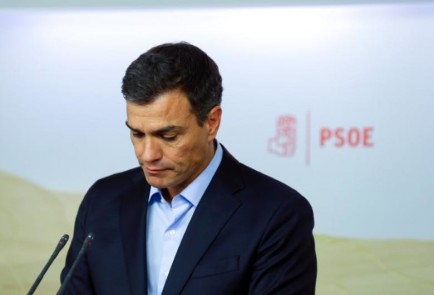
Spain’s Socialist Party (PSOE) leader Pedro Sánchez is facing calls to stand aside. He himself has called a leadership election on Oct 23.
The prospect of a third general election in the space of a year, apparently to be held on Christmas Day no less, appears to be too much for some members of the Socialist Party (PSOE) who are expected to pressure the party leader, Pedro Sánchez, to stand aside and allow the other parties to form a government…
In attempting to unravel what is becoming an increasingly complex situation, some PSOE members are willing to forego all hope of forming a minority government and allow the Popular Party (PP), led by Mariano Rajoy, to gather together the remaining votes it needs to form a coalition.
Last weekend’s regional elections saw the PSOE lose ground in two northern regions – Galicia and Basque Country – prompting some from within the party to admit that now may be the time for it to retire from the race gracefully.
However, Sánchez was initially bullish, stating after the disappointing results that his “no” to Mr Rajoy has “never been more justified”. But senior PP member Pablo Casado has called on Sánchez to reflect on the possibility of allowing Rajoy to form a government.
The PP has won the most votes in the last two general elections, but each time failed to win enough to form a majority government, and has instead had to seek viable partnerships with smaller rival parties. In holding the second-most votes, the PSOE has always had a strong veto hand to play – and has used it stubbornly since last December.
But if Sánchez could be persuaded to stand aside, it would mean that the votes garnered by the PSOE would be classed as an abstention, ie, they wouldn’t count in a final vote tally, therefore effectively handing the reins of government to the PP, albeit a PP at the helm of a fragmented coalition that could include centrist party Ciudadanos.
If this does not happen before October 31, then a Christmas vote is pretty much on the cards for Spaniards. Interestingly, Sánchez has called an internal PSOE leadership race for October 23, which certainly seems to signal that he will not be changing his stance on the matter, and for the PSOE to abstain, it will have to do so under the leadership of somebody else.
 en
en



 Vlaams-Nederlands
Vlaams-Nederlands
0 Comments
Leave a Comment
DISCLAIMER
The opinions and comments expressed by contributors to this Blog are theirs alone and do not necessarily reflect the views of VIVA Homes Under the Sun Ltd, any of its associated companies, or employees; nor is VIVA to be held responsible or accountable for the accuracy of any of the information supplied.
Have you got something to say?